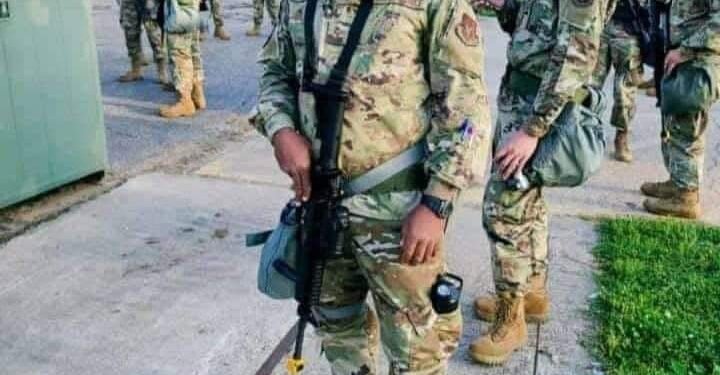Why Trump’s remarks should wake Nigeria up, not divide it
When President Donald Trump recently threatened possible U.S. military intervention in Nigeria, it sent shockwaves across the country and the diaspora. Social media exploded with panic, speculation, and conspiracy theories.
As both a proud U.S. Air Force veteran and a Nigerian deeply concerned about the state of my homeland, I believe it is time to separate emotion from logic and look at the situation for what it really is.
Let us be clear: the United States will not invade Nigeria.
President Trump’s words, though forceful, are not a declaration of war. They are a pressure tactic, a diplomatic move meant to push Nigeria’s leadership to confront an escalating internal crisis that the world can no longer ignore.
Under the Tinubu administration, Nigeria’s security architecture has deteriorated at an alarming pace. From Southern Kaduna to Plateau State, countless communities have endured unimaginable violence. Villages have been destroyed, families displaced, and lives shattered.
The debate over whether this crisis amounts to genocide misses the point entirely. We do not need a genocide before we act. The bloodshed, displacement, and fear across affected regions are already far beyond acceptable limits.
Videos, eyewitness accounts, and on-the-ground reports all tell the same story: citizens cry out for help, and government response comes too late, if at all. While Nigerians of every faith have suffered, the Christian minority in Northern Nigeria has been particularly devastated.
So, while President Trump’s remarks may sound provocative, they have forced an uncomfortable but necessary conversation about Nigeria’s worsening insecurity and the government’s lack of urgency.
Despite Trump’s tough talk, a U.S. invasion of Nigeria is not on the table, not now or ever. The United States does not launch military campaigns where there is no direct national security or economic interest, and Nigeria poses neither.
America’s defense posture is guided by protecting U.S. citizens, allies, and trade routes, not by starting expensive wars in friendly nations.
The conspiracy theory that the U.S. wants to invade Nigeria for its resources is both illogical and unsupported by facts.
Here are the facts:
1. Natural Resources: The U.S. has far greater mineral wealth than Nigeria, an estimated $45 trillion worth, including the world’s largest proven coal reserves and substantial deposits of oil, gas, uranium, gold, and copper.
2. Rare Earth Elements (REEs): As of 2025, the U.S. holds about 1.9 million metric tons of rare earth reserves, among the largest globally. Nigeria’s are around 13,000 tonnes, notable regionally but minimal in global comparison.
3. Oil and Gas: The U.S. is the world’s largest natural gas producer and a net exporter of crude oil. In early 2025, it even exported crude to Nigeria for the first time, while Nigeria’s Dangote Refinery later shipped gasoline to the U.S. This shows a relationship of trade, not competition.
In short, America has no reason to invade Nigeria. It benefits far more from peace, partnership, and economic cooperation than from confrontation.
Where Nigeria should be worried is not in the threat of invasion but in its diplomatic direction.
In recent years, Nigeria has inched closer to the BRICS alliance, which includes China, Russia, India, Brazil, and South Africa, while drifting away from its long-standing Western partners. That shift might seem like political strategy, but it risks isolating Nigeria from powerful global allies that have historically supported its stability.
For all its flaws, the United States remains the world’s most powerful nation economically, militarily, and technologically. Nigeria, as Africa’s largest democracy and most populous country, stands to gain far more from maintaining a balanced, transparent, and strategic partnership with Washington than from trying to realign completely elsewhere.
Across the Sahel, terrorist movements are resurging. Mali is teetering on the edge of being overtaken by Al-Qaeda-linked forces, an outcome that would ripple across the region.
Nigeria must not be a spectator. It must lead. That leadership begins with fixing what is broken at home, rebuilding our security institutions, restoring public trust, and demonstrating that the Nigerian state still has the capacity and will to protect its people.
President Trump’s remarks, while blunt, should be viewed not as an insult to Nigeria’s sovereignty but as a wake-up call. The Nigerian government must not wait for foreign threats to do what leadership and duty already demand.
Conclusion
The United States will not invade Nigeria because it has no strategic, economic, or moral incentive to do so. But Nigeria should not need the fear of foreign intervention to address its deep internal decay.
The tragedy of our political situation isn’t that outsiders are plotting against us, it’s that we keep standing still while our own house burns.
What this moment calls for is not panic, but purpose. Not conspiracy, but competence. Not rhetoric, but real leadership.
Nigeria must awaken, take responsibility, and reclaim its destiny.
ABOUT THE AUTHOR:
Osasere Osifo is a U.S. Air Force veteran and cybersecurity Expert. He writes on global security, governance, and national transformation.







